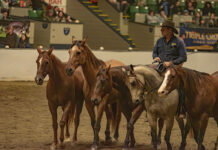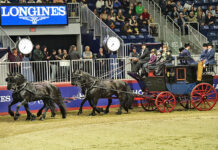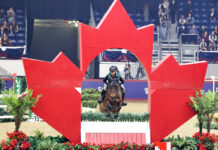 |
| A grazing muzzle is one device used to prevent too much weight gain during the spring and summer, but research shows that equine obesity is still a concern during the winter. Photo: Leslie Potter |
Plenty of humans bemoan winter’s weight gain. Holiday goodies followed by months of little daylight and inhospitable weather lead to less physical activity and often weight gain. On the other hand, most horse owners assume that their pastured horses will lose some weight during the months when the grass is dormant and covered in snow. A recent study, presented as Variation in body condition in small groups of horses at the International Equitation Science Conference suggests that this is not always the case.
More horses than ponies were obese based body condition score, where 27.6% were determined to be obese. More ponies had a high cresty neck score, with 48.8% of the equines rating a three or above on the five-point scale.
Although there is less grass available during the winter months, owners may overcompensate with too much supplementary feed. Many owners choose to keep their horses blanketed in the winter and may also reduce their workload, which prevents extra calorie burning. Since horses with access to grass are likely to gain weight in the spring and summer, beginning the season with a high body weight can be dangerous for equines that tend to be easy keepers.
Further Reading
Research shows that more than 20 percent of horses are too fat
Balancing your horse’s diet to achieve an ideal weight






This is definitely my horse!
Aye, very interesting, as it is true. I know of a herd of horses that winters on 50% grass; pawing through the 3-foot deep snow to get it, and the other 50% of their feed is hay. Not rich hay, either. In fact, the hay is 1/2 quality as all the other hay for sale; for that reason nobody bought it and yet I know someone who feeds it to that herd; in the Spring the herd is fat. So, diet is in order. These horses eat snow, have no blankets, barns, or even a shed. In summer, they drink out of a pond. That’s what I call survival!
This is a good description of my horses.
Definitely not my horse. He’s an easy keeper but I’m a mean old grinch. He’s always about a 4 on the fatness scale but he quickly gets back up to 6 once the spring grass starts growing.
So many horses/ponies keep there weight because of the round bales of hay, which seem to be the normalway of making/buying hay. Horses do not get enough excerise if you live where you have to keep the horses close to the barn/sheds, because the pastures are snow covered, and electric fencing do not work as well in the winter.